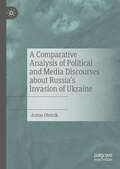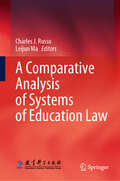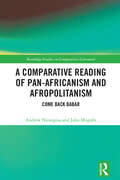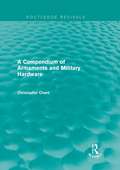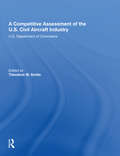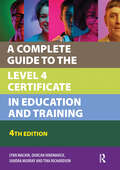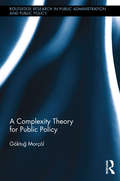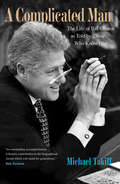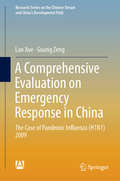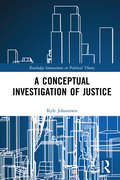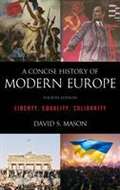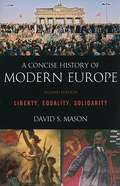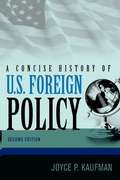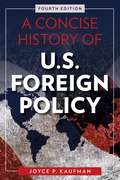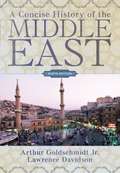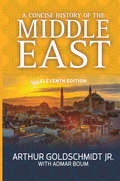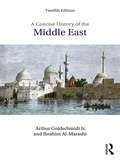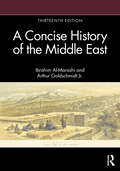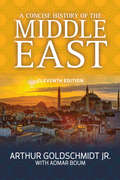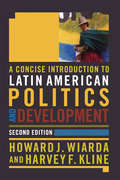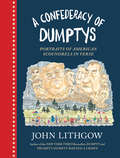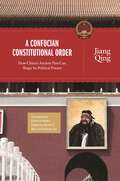- Table View
- List View
A Comparative Analysis of Political and Media Discourses about Russia’s Invasion of Ukraine
by Oleinik AntonThis book explores the discursive dimension of Russia’s invasion of Ukraine. It analyzes how political leaders, mass media, social media, and ordinary people in Ukraine, Russia, the United States, the United Kingdom, and France discuss the war. War propaganda and counterpropaganda structure discourses about the invasion, strengthening post-truth conditions. The book highlights the consequences of the growing distrust in the institutional truth-teller, mass media. Russia’s invasion of Ukraine is the first social media war. Social media became the principal source of information about the invasion. The rise of digital media did not change the tendency of the discourses about war to be territorially segregated according to national boundaries. Nationalization of discourses about war continues to prevail over their globalization. The corpora containing more than 180 million words in four languages inform the analysis. The data was collected during the first year and a half of Russia’sall-out war in Ukraine.
A Comparative Analysis of Systems of Education Law
by Charles J. Russo Leijun MaThis book focuses on enhanced educator awareness of issues involving the status of the right to education as guaranteed by various legal systems throughout the world, in light of the growing interest in comparative and international studies, including the law. Consequently, this interdisciplinary, comparative book, which includes original chapters by leading academicians with expertise in law and education, is designed to serve as a resource for researchers in education and law as well as policymakers and students. To this end, the book provides readers with an enhanced awareness of the nature of legal systems impacting education throughout the world. Education is the driving force of the world development as well as the basic way to realize human rights and values. At the same time, law plays an important role in the protection, evaluation, guidance, and promotion in the process of the development of education. The book thus has interdisciplinary appeal. Various audiences will find this highly accessible book informative and valuable, including scholars with an interest in Education Law, university faculty and classes (whether involved in teacher preparation or educational leadership), legal practitioners, and university libraries.
A Comparative Political Ecology of Exurbia: Planning, Environmental Management, and Landscape Change
by Laura E. Taylor Patrick T. HurleyThis book is about politics and planning outside of cities, where urban political economy and planning theories do not account for the resilience of places that are no longer rural and where local communities work hard to keep from ever becoming urban. By examining exurbia as a type of place that is no longer simply rural or only tied to the economies of global resources (e. g. , mining, forestry, and agriculture), we explore how changing landscapes are planned and designed not to be urban, that is, to look, function, and feel different from cities and suburbs in spite of new home development and real estate speculation. The book's authors contend that exurbia is defined by the persistence of rural economies, the conservation of rural character, and protection of natural ecological systems, all of which are critical components of the contentious local politics that seek to limit growth. Comparative political ecology is used as an organizing concept throughout the book to describe the nature of exurban areas in the U. S. and Australia, although exurbs are common to many countries. The essays each describe distinctive case studies, with each chapter using the key concepts of competing rural capitalisms and uneven environmental management to describe the politics of exurban change. This systematic analysis makes the processes of exurban change easier to see and understand. Based on these case studies, seven characteristics of exurban places are identified: rural character, access, local economic change, ideologies of nature, changes in land management, coalition-building, and land-use planning. This book will be of interest to those who study planning, conservation, and land development issues, especially in areas of high natural amenity or environmental value. There is no political ecology book quite like this--neither one solely focused on cases from the developed world (in this case the United States and Australia), nor one that specifically harnesses different case studies from multiple areas to develop a central organizing perspective of landscape change.
A Comparative Reading of Pan-Africanism and Afropolitanism: Come Back Babar (Routledge Studies in Comparative Literature)
by Andrew Nyongesa John MugubiThis book is response to the recent surge of formidable voices that consistently demean and attempt to reverse the gains of pan-Africanism. Besides questioning its relevance, these voices supplant essential tenets of pan-Africanism – Blackness, the narrative of Return, sanctity of the ancestral homeland, exposition of evils of colonialism and African Literature – with new postulations. These new suppositions deny race, accentuate onward migration and diminish the ancestral homeland to any ordinary city to globetrot. These voices liken any reminiscence of colonial evils to Afro-pessimism, pronounce African Literature dead on arrival and proceed to ‘substitute’ pan-Africanism through studies, which neglect pioneer and contemporary literary works, cultural productions, folklore, conversations on social media (blogs, Facebook, WhatsApp) and questionnaires to gauge their influence among Black peoples themselves. This study adopts a design that interrogates literary works, data from questionnaires and social media to determine the relevance and influence of pan-Africanism and the new paradigm.
A Compendium of Armaments and Military Hardware (Routledge Revivals)
by Christopher ChantFirst published in 1987, The Compendium of Armaments and Military Hardware provides, within a single volume, the salient technical and operational details of the most important weapons. The complete range of hardware used in land, sea and air forces throughout the world at the time of publication is covered, from tanks to rocket systems, helicopters to cruise missiles, alongside full details of size, weight and operational range. The book’s main strength lies in the detail it gives of armament and associated ammunition capabilities, and of the sensors and other electronics required for the weapons to be used effectively. A key title amongst Routledge reference reissues, Christopher Chant’s important work will be of great value to students and professionals requiring a comprehensive and accessible reference guide, as well as to weapons ‘buffs’.
A Competitive Assessment Of The U.S. Civil Aircraft Industry
by Theodore W SchlieIn 1985, the U.S. aerospace industry achieved a $13.1 billion trade surplus and contributed $89.2 billion in shipments to the U.S. economy. Without·aerospace, the U.S. trade balance in high technology industries would--for the first time--have fallen into a deficit. Civil aircraft play a significant role in the U.S. aerospace industry, and U.S. civil aircraft have dominated world markets (particularly the large transport segment) since the development of jet engine aircraft in the 1950s. This dominance has recently been challenged by the emergence of the European Airbus Industrie, which has achieved a significant market position in wide-body aircraft and appears committed to the development of a diversified family of civil aircraft. Industry observers are also concerned about the possibility of Japan entering the large transport competition. In this assessment, the U.S. Department of Commerce examines the prospects for continued international competitiveness of U.S. civil aircraft. The report identifies key factors that will determine the shape of future competition, develops alternative scenarios for the future, and presents-a framework within which developments can be monitored and measured.
A Complete Guide to the Level 4 Certificate in Education and Training (Further Education)
by Duncan Hindmarch Lynn Machin Sandra Murray Tina RichardsonA complete and updated all-in-one guide to the Level 4 Certificate in Education and Training, suitable for use with any awarding organisation.This fourth edition of the bestselling text for all those working towards the Level 4 Certificate in Education and Training has been fully updated and tailored to meet the refreshed ETF Standards. It therefore provides an increased focus on subject pedagogy and covers information relating to a range of new and contemporary issues. It incorporates key information on reflective practice and study skills, and provides full coverage of all the mandatory units. Accessible language is combined with a critical approach that clearly relates practical examples to the required underpinning theory. Specifically, this fourth edition: takes into account the new Minimum Core incorporates Digital Skills and the ETF EdTech Strategy includes a new end of chapter feature to develop evidence-informed practice recognises the need to provide better support and guidance to learners around gender, sexuality, racism, mental health and well-being supports the revolution in online practices and implications for hybrid working and learning reflects the escalating importance of the sustainability agenda is suitable for use with all awarding organisations and HEIs provides the depth and criticality to meet level 4 requirements. User friendly, easy to read and covered a good range of material with good examples and case studies. Kerry Adam South Staffordshire College.The study skills section is very good - it picks up on the main issues facing trainees in Education and Training contexts and ensures that the advice and guidance are directly relevant to these learners. Also good are the sections on teaching observations and progression. Paul G Daniels Dearne College.I will be recommending it for its simplicity as a core text for our new ITT introductory programme. Christian Beighton Canterbury Christchurch.
A Complexity Theory for Public Policy (Routledge Research in Public Administration and Public Policy)
by Göktuğ MorçölComplexity theory has become popular in the natural and social sciences over the last few decades as a result of the advancements in our understanding of the complexities in natural and social phenomena. Concepts and methods of complexity theory have been applied by scholars of public affairs in North America and Europe, but a comprehensive framework for these applications is lacking. A Complexity Theory for Public Policy proposes a conceptual synthesis and sets a foundation for future developments and applications. In this book, Göktuğ Morçöl convincingly makes the case that complexity theory can help us understand better the self-organizational, emergent, and co-evolutionary characteristics of complex policy systems. In doing so, he discuss the epistemological implications of complexity theory and the methods complexity researchers use, and those methods they could use. As the complexity studies spread more around the world in the coming decades, the contents of this book will become appealing to larger audiences, particularly to scholars and graduate students in public affairs. The unique combination of synthesis and explanation of concepts and methods found in this book will serve as reference frames for future works.
A Complicated Man: The Life of Bill Clinton as Told by Those Who Know Him
by Michael Takiff&“An astonishing collection of 171 interviews with Clinton&’s friends, foes, admirers, and detractors as well as reporters and political analysts.&”—Booklist (starred review). Though Bill Clinton has been out of office since 2001, public fascination with him continues unabated. Many books about Clinton have been published in recent years, but shockingly, no single-volume biography covers the full scope of Clinton&’s life from the cradle to the present day, not even Clinton&’s own account, My Life. More troubling still, books on Clinton have tended to be highly polarized, casting the former president in an overly positive or negative light. In this, the first complete oral history of Clinton&’s life, historian Michael Takiff presents the first truly balanced book on one of our nation&’s most controversial and fascinating presidents. Through more than 150 chronologically arranged interviews with key figures—including Bob Dole, James Carville, and Tom Brokaw, among many others—A Complicated Man goes far beyond the well-worn party-line territory to capture the larger-than-life essence of Clinton the man. With the tremendous attention given to the Lewinsky scandal, it is easy to overlook the president&’s humble upbringing, as well as his many achievements at home and abroad: the longest economic boom in American history, a balanced budget, successful intervention in the Balkans, and a series of landmark, if controversial, free-trade agreements. Through the candid recollections of Takiff&’s many subjects, A Complicated Man leaves no area unexplored, revealing the most complete and unexpected portrait of our forty-second president published to date. &“Packed with fascinating personal perspective and testimony.&”—Nigel Hamilton, bestselling and award-winning author of American Caesars
A Comprehensive Evaluation on Emergency Response in China: The Case of Pandemic Influenza (H1N1) 2009 (Research Series on the Chinese Dream and China’s Development Path)
by Lan Xue Guang ZengThis book is a third-party evaluation of H1N1 prevention and control effects in China. Based on the characteristic of H1N1 pandemic around the world and current public health management system in China, this book evaluates the comprehensive effects by considering the countermeasures, joint prevent and control mechanism operated by central and local government, the cost and benefit effects and also the social influence during the whole process. Using the methods of interview and questionnaire, it investigates the central and local government, disease control and prevention center, hospital, community, school and enterprise in Beijing, Fujian, Henan, Guangdong and Sichuan provinces, and also presents the response from the public, patient and close contacts to evaluate the overall effects from different stakeholders. Assessment findings and policy suggestions are included in the book on the way to improve the efficiency of public health emergency system in China. This book provides a good reference to researchers and officials in public management, crisis management and public health studies.
A Conceptual Investigation of Justice (Routledge Innovations in Political Theory)
by Kyle JohannsenConceptual analysis has fallen out of favor in political philosophy. The influence of figures like John Rawls and Ronald Dworkin has led political philosophy to focus on questions about what should be done, and to ignore questions about the usage of words. In this book, Kyle Johannsen calls for renewed attention to the manner in which the word ‘justice’ is and should be used. Focusing on the late work of G.A. Cohen, Johannsen argues that debates over both the content and scope of egalitarian justice are, to a large extent, really just conceptual. Whereas some philosophers have been using the term ‘justice’ to refer to one among a plurality of values, others have been using it to refer to institutional rightness. Though the latter use of ‘justice’ is presently more dominant, he argues that much is to be gained from thinking of justice as one value among many. Doing so sheds light on the nature of both democracy and legitimacy, and, paradoxically, makes better sense of the idea that justice is ‘the first virtue of institutions’.
A Concise History Of Modern Europe: Liberty, Equality, Solidarity
by David MasonHighlighting the key events, ideas, and individuals that have shaped modern Europe, this fresh and lively book provides a concise history of the continent from the Enlightenment to the present. <p><p> Drawing on the enduring theme of revolution, David S. Mason explores the political, economic, and scientific causes and consequences of revolution; the development of human rights and democracy; and issues of European identity and integration. He deliberately avoids a detailed chronology of every country and time period, instead emphasizing the most crucial events in shaping contemporary Europe. <p> Fourteen focused chapters address such topical issues as the Enlightenment; the French Revolution and Napoleon; the Industrial Revolution; the theories and impact of Marx and Darwin; the revolutions of 1848, 1917, and 1989; the unifications of Germany and Italy; European imperialism; the two world wars; the Cold War; the evolution and expansion of the European Union; and current issues confronting Europe. Any reader who wants to view the broad sweep of European history will find this book an engaging narrative, supplemented with maps, timelines, sidebars, photos, and a glossary.
A Concise History of Modern Europe: Liberty, Equality, Solidarity
by David S. MasonHighlighting the key events, ideas, and individuals that have shaped modern Europe, this fresh and lively book provides a succinct history of the continent from the Enlightenment to the present. Drawing on the enduring theme of revolution, David S. Mason explores the causes and consequences of revolution: political, economic, and scientific; the development of human rights; and issues of European identity and integration. He deliberately avoids a detailed chronology of every country and time period by emphasizing the most crucial events in shaping contemporary Europe. Fourteen focused chapters address such topical issues as the Enlightenment; the French Revolution and Napoleon; the Industrial Revolution; the theories and impact of Marx and Darwin; the revolutions of 1848, 1917, and 1989; the unifications of Germany and Italy; European imperialism; the two World Wars; the Cold War and decolonization; and the evolution and expansion of the European Union. Any reader needing a broad overview of the sweep of European history since 1789 will find this book, published in a first edition under the title Revolutionary Europe, an engaging and cohesive narrative.
A Concise History of U.S. Foreign Policy
by Joyce P. KaufmanA Concise History of U. S. Foreign Policy offers a conceptual and historical overview of American foreign relations from the founding to the present. Joyce Kaufman clearly explains major themes in foreign relations and places the evolution of policy decisions within the context of the international situations and domestic priorities.
A Concise History of U.S. Foreign Policy
by Joyce P. KaufmanThe book focuses on the major actors involved in the making of foreign policy and the changing relationships among them. It also explains the major theoretical perspectives within international relations and places key foreign policy decisions within these frameworks. Kaufman concludes with a look forward to the challenges the United States will face in the coming decades. With its strong narrative and use of compelling case studies, the book engages students fully in this crucial topic, encouraging them to form their own ideas about American foreign policy.
A Concise History of the Middle East
by Lawrence Davidson Arthur Goldschmidt Jr.The ninth edition of this widely acclaimed text by Arthur Goldschmidt Jr. and Lawrence Davidson has been extensively revised to reflect the latest scholarship and the most recent events in the Middle East.<P><P> As an introduction to the history of this turbulent region from the beginnings of Islam to the present day, the book is distinguished by its clear style, broad scope, and balanced treatment. It focuses on the evolution of Islamic institutions and culture, the influence of the West, the modernization efforts of Middle Eastern governments, the struggle of various peoples for political independence, the course of the Arab-Israeli conflict, the reassertion of Islamic values and power, the issues surrounding the Palestinian Question, and the roles of Iraq and Iran in the post-9/11 Middle East. Nine maps newly commissioned for the ninth edition highlight key aspects of Middle East history. Two popular study aids, the chronology and the glossary, have been extensively revised, and the superlative bibliographic essay, an essential guide to further reading, has been thoroughly rewritten to reflect current scholarship.
A Concise History of the Middle East
by Arthur Goldschmidt Jr.An introduction to the history of this turbulent region from the beginnings of Islam to the present day, this widely acclaimed text by Arthur Goldschmidt Jr. is distinguished by its clear style, broad scope, and balanced treatment. This book explores the evolution of Islamic institutions and culture, the influence of the West, the modernization efforts of Middle Eastern governments, the struggle of various peoples for political independence, the Arab-Israeli conflict, the reassertion of Islamic values and power, the issues surrounding the Palestinian Question, and the post-9/11 Middle East.The eleventh edition has been fully revised to reflect the most recent events in, and concerns of, the region, including an expanded and more nuanced discussion of the "War on Terrorism" and the Arab uprisings, coverage of the rise of ISIS, and a new chapter on the growing environmental problems of the region. In addition, the authors have incorporated new scholarship on the early history to provide a fuller picture of the political shifts and socioeconomic concerns of that time. With updated bibliographical sketches, chronology and glossary, A Concise History of the Middle East remains an essential text for students of Middle East history.
A Concise History of the Middle East
by Arthur Goldschmidt Jr. Ibrahim Al-MarashiA Concise History of the Middle East provides a comprehensive introduction to the history of this turbulent region. Spanning from pre-Islam to the present day, it explores the evolution of Islamic institutions and culture, the influence of the West, modernization efforts in the Middle East, the struggle of various peoples for political independence, the Arab–Israel conflict, the reassertion of Islamic values and power, the issues surrounding the Palestinian Question, and the Middle East post-9/11 and post-Arab uprisings. The twelfth edition has been fully revised to reflect the most recent events in, and concerns of, the region, including the presence of ISIS and other non-state actors, the civil wars in Syria and Yemen, and the refugee crisis. New parts and part timelines will help students grasp and contextualize the long and complicated history of the region. With updated biographical sketches and glossary, and a new concluding chapter, this book remains the quintessential text for students of Middle East history.
A Concise History of the Middle East
by Ibrahim Al-Marashi Arthur Goldschmidt Jr.A Concise History of the Middle East provides a comprehensive introduction to the history of this region. Spanning from the pre-Islamic era to the present, it explores the evolution of Middle Eastern institutions and culture, the influence of European colonialism and Western imperialism, regional modernization efforts, the struggle of various peoples for political independence, the Arab–Israeli conflict, the reassertion of Islamist values and power, the issues surrounding the Palestinian Question, and the Middle East following 9/11, the 2011 Arab uprisings, and the regional crisis that erupted after 7 October 2023.The thirteenth edition has been fully revised to reflect the most recent events in, and concerns of, the region, including its future in the face of climate change and challenges in Iraq, and developments in the Israeli–Palestinian conflict. In addition, the important role of Middle Eastern women in the history of the region is woven into the narrative. New parts and part timelines will help students grasp and contextualize the long and complicated history of the region.With updated biographical sketches and a new concluding chapter, this book remains the quintessential text for students of Middle East history.
A Concise History of the Middle East: Eleventh Edition
by Arthur Goldschmidt Jr. Aomar BoumAn introduction to the history of this turbulent region from the beginnings of Islam to the present day, this widely acclaimed text by Arthur Goldschmidt Jr. is distinguished by its clear style, broad scope, and balanced treatment. This book explores the evolution of Islamic institutions and culture, the influence of the West, the modernization efforts of Middle Eastern governments, the struggle of various peoples for political independence, the Arab-Israeli conflict, the reassertion of Islamic values and power, the issues surrounding the Palestinian Question, and the post-9/11 Middle East. The eleventh edition has been fully revised to reflect the most recent events in, and concerns of, the region, including an expanded and more nuanced discussion of the "War on Terrorism" and the Arab uprisings, coverage of the rise of ISIS, and a new chapter on the growing environmental problems of the region. In addition, the authors have incorporated new scholarship on the early history to provide a fuller picture of the political shifts and socioeconomic concerns of that time. With updated bibliographical sketches, chronology and glossary, A Concise History of the Middle East remains an essential text for students of Middle East history.
A Concise Introduction to Latin American Politics and Development
by Howard J. Wiarda Harvey F. KlineThis succinct overview of the political factors that condition social and economic development in Latin America is the perfect core text in courses on politics, government, social change, and transitions to democracy throughout Latin America and the Caribbean.
A Confederacy of Dumptys: Portraits of American Scoundrels in Verse
by John LithgowThe next book in John Lithgow's New York Times bestselling seriesFollowing the success of New York Times bestsellers Dumpty and Trumpty Dumpty Wanted a Crown, award-winning actor, author, and illustrator John Lithgow presents the third book in his runaway hit series. A Confederacy of Dumptys takes us through a history of twenty-five "American Scoundrels" in this all-new collection of Lithgow's satirical poems and illustrations.While the Trump Era was rife with corruption and abuse of power, it was nothing new. Through Lithgow's cutting humor, you will read about a rogues' gallery of villains that came before Donald J. Trump, powerful men and women who were corrupt, venal, criminal, adulterous, racist, or just plain disgusting. With dark and lyrical stories from across American history, you will learn about long-forgotten figures and bad actors of today, including the first Grand Wizard of the Ku Klux Klan, the perpetrator of 19th century women's pyramid schemes, and participants in both the Watergate scandal and the Capitol insurrection. Trump and Nixon show up, of course, but also Leona Helmsley, Boss Tweed, Typhoid Mary, Newt Gingrich, Ted Cruz, and many more. Skipping through time, and delivered with classic Lithgow wit and style, A Confederacy of Dumptys is an exuberant reminder of how not to repeat history.Digital audio edition read by the author.The perfect book for:• Political satire fans—viewers of The Daily Show with Trevor Noah, Last Week Tonight with John Oliver, and The Late Show with Stephen Colbert.• American history buffs and trivia enthusiasts—readers of Jon's Stewart's America (The Book): A Citizen's Guide to Democracy Inaction and Josh Clark's Stuff You Should Know: An Incomplete Compendium of Mostly Interesting Things.• Poetry, art, and illustration aficionados.
A Conflict of Interest
by Barbara DunlopShe tried to stay away from him....More than once, White House PR specialist Cara Cranshaw has considered that reporter Max Gray might want her only because he can't have her. Given their work, a relationship is dicey-and impossible now that the president has taken office.For Max, their relationship may be a lark, a fling-maybe she's just another woman in the long line that forms a part of his bachelor lifestyle. But for her, what they have is different. She's all but given him her heart. And now she is having his baby.
A Confucian Constitutional Order: How China's Ancient Past Can Shape Its Political Future (The Princeton-China Series #4)
by Jiang QingWhat a Confucian constitutional government might look like in China's political futureAs China continues to transform itself, many assume that the nation will eventually move beyond communism and adopt a Western-style democracy. But could China develop a unique form of government based on its own distinct traditions? Jiang Qing—China's most original, provocative, and controversial Confucian political thinker—says yes. In this book, he sets out a vision for a Confucian constitutional order that offers a compelling alternative to both the status quo in China and to a Western-style liberal democracy. A Confucian Constitutional Order is the most detailed and systematic work on Confucian constitutionalism to date.Jiang argues against the democratic view that the consent of the people is the main source of political legitimacy. Instead, he presents a comprehensive way to achieve humane authority based on three sources of political legitimacy, and he derives and defends a proposal for a tricameral legislature that would best represent the Confucian political ideal. He also puts forward proposals for an institution that would curb the power of parliamentarians and for a symbolic monarch who would embody the historical and transgenerational identity of the state. In the latter section of the book, four leading liberal and socialist Chinese critics—Joseph Chan, Chenyang Li, Wang Shaoguang, and Bai Tongdong—critically evaluate Jiang's theories and Jiang gives detailed responses to their views.A Confucian Constitutional Order provides a new standard for evaluating political progress in China and enriches the dialogue of possibilities available to this rapidly evolving nation. This book will fascinate students and scholars of Chinese politics, and is essential reading for anyone concerned about China's political future.
A Confusion of Princes
by Garth NixPrince wants to become Emperor and the surest way to do so is to kill, dishonor, or sideline any potential competitor. There are rules, but as Khemri discovers, rules can be bent and even broken.
